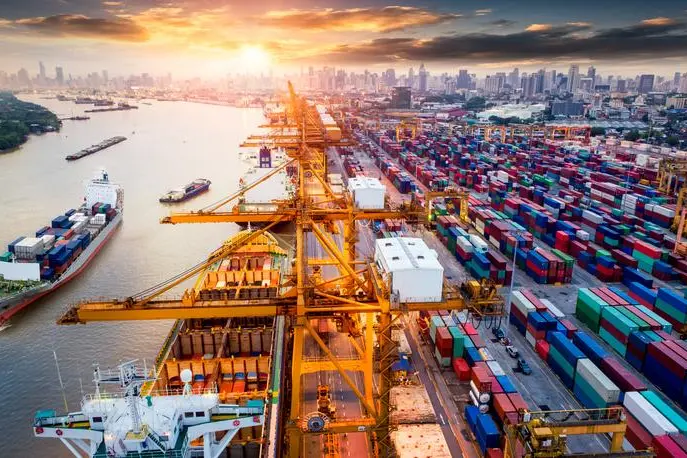PHOTO
The UAE's logistics sector is gaining momentum as more and more startups open their shops offering latest solutions and services, tracking real time shipment, beating turn around time for deliveries and so on. While the UAE may see the blend of conventional logistics players and startups, the challenge now remains how will the existing players face competition from startups who are more equipped in terms of latest technology that offers transparency at a click of a button and the traditional logistic company which is run on years of networking in the industry.
The techonlogy adoption has helped companies to bring buyers and sellers on one platform with much smarter processes easing the cumbersome process of locating vehicles, fleets, tracking delivery points. The internet boom in the UAE did boost the e-commerce growth in last couple of years but one of the biggest challenge was delivering the goods as promptly as the click on your mouse. The logistics sector sees firms competing to deliver within hours and on same day within the UAE.
Just to name a few popular brands like Truxapp, Trukker, Yalla Pickup, Quipqup and RSA Logistics agree that though the industry is becoming very competitive the question remains what innovation are you bringing to table to help capture your market share. According to MAGNiTT's 2017 State of Mena Funding report industries such as e-commerce, fintech, food and beverage and logistics and transport are the most preferred sectors where startups disrupt the industry. In last five years 8 per cent of exits in startups was recorded in the logistics sector.
According to the recent analysis of DCCI, the UAE's air freight market will expand by a CAGR of 4.8 per cent over the 2017-2021 period. Over the same time span, container port traffic in the UAE is expected to rise from 22.4 million TEUs in 2017 to 28.4 TEUs by 2021.
So why is the UAE's logistics sector a hot bet? The UAE's geographical location and infrastructure make it an ideal supply and re-distribution gateway and offer huge growth potential for the operating logistics players. It is strategically located at the centre of international trade making it globally well positioned as an emerging transshipment hub. UAE ports have emerged as important transhipment points in the Europe-Asia trade lane and multi-modal logistics hubs to cater to the needs of increasing trade within the region, says Gaurav Biswas, founder and CEO, Trukker Technologies.
While several industries are becoming digitally enabled, the logistics sector has largely been neglected, or not given the necessary attention, because of its complexities as a B2B service. Currently, the logistics is lagging and this is affecting growth in many other sectors that depend on the efficient movements of goods. Today's digital savvy, connected consumers expect faster accurate deliveries and an optimal user experience which can make or break brand loyalty, which also has an effect on revenues.
UK-based startup, Quiqup offers technology that businesses can tap into in minutes and a service to deliver goods in minimum time. Dani El-Zein, general manager UAE, Quqiup, said: "The movement of goods across countries and within cities has to be increasingly streamlined to power next day, same day, and even same hour deliveries. The only way logistics companies can stay competitive with so many players vying for customers is through tech and service excellence. The industry is moving very quickly and the players that will survive and thrive our those who will stay ahead of the curve, anticipate ever-growing consumer needs, and develop the technology and customer operations necessary to fulfil those needs. Those who don't, won't."
According to Frost & Sullivan, in 2016, the size of the logistics sector in GCC was estimated to be $ $107 billion of which the road transportation sector accounted for $26.9 billion growing at a conservative rate of 5 per cent year on year. This indicates that there is room for growth for several players.
Naseer Ahmed, chief executive officer & general manager, Truxapp, said: "Start-ups who have right blend of robust technical capabilities, strong industry experience and thorough geography knowledge, not only will be able to cross the entry barrier effectively, but also sustain over long run. Lastly, as the technology adaptation curve across B2B sector is relatively more spread out than B2C sector adaptation; investors, users and other stakeholders will realise the worth in due time frame; patience pays off."
According to a report published by BMI Research, the Middle East is one the fastest growing e-commerce markets in the world. The report projects that the sales volume of in the region will expand to $22.3 billion in 2020 from $15 billion in 2015, indicating 50 per cent growth over a period of 5 years, presenting growth and opportunity to the logistics industry which will have to re-invent itself to cope up with the demand for services.
Elie El Tom, Founder and CEO of Yalla Pickup, said: "The market is growing fast, and we are here to assist each other in serving the clients. I believe in collaborations among all players as there is room for everyone; a perfect example would be our collaboration with Wing.ae where we push to them all parcels deliveries and they push to us the large consignment ones. Collaboration is key in this market if we all wish to have a sustainable growth."
Echoing similar positive sentiment, Sandeep Ponnappa, general manager, contract logistics and transportation at RSA Logistics, said: "Dubai is a fertile logistics hub for companies who want to offer supply chain services, and as service providers strive to create new solutions for their customers, this ensures constant cargo traffic through the region, albeit with some ups and downs in volume. Mega events such as Expo 2020 are also designed to generate logistic activity. The industry is competitive and inevitably, the natural selection process will favour companies who are agile and tech-friendly."
Copyright © 2018 Khaleej Times. All Rights Reserved. Provided by SyndiGate Media Inc. (Syndigate.info).





















